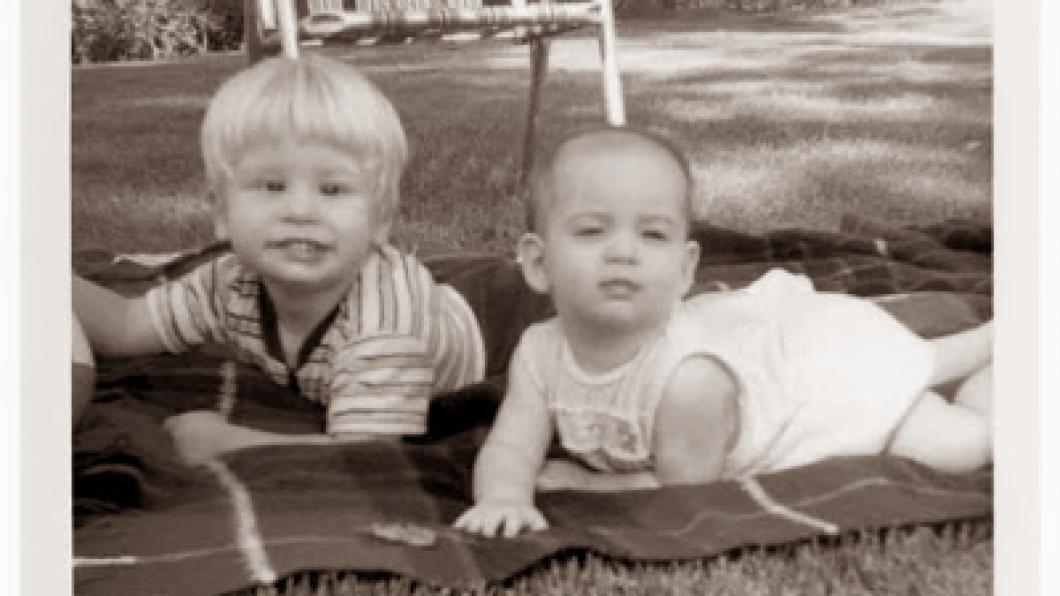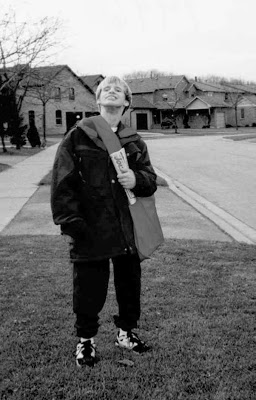
A lesson in love
Donna Kirk is the author of Finding Matthew: A Child with Brain Damage, A Young Man with Mental Illness, A Son and Brother with Extraordinary Spirit. Here she shares the challenges and joys in her family's remarkable journey to give Matthew (above left with his sister Kelley) a good life. Thank you Donna! Louise
By Donna Kirk
“Your son is a vegetable with a heartbeat.”
The head pediatrician at the hospital dismissed our first born child with a wave of his hand. My husband Ed and I were dumbfounded.
“Your child will never know you or progress beyond the infant stage. I recommend that you institutionalize him as soon as a bed becomes available. I’ll give the consent forms for the home to the neo-natal nurses.”
Our child’s name was Matthew. He had suffered oxygen loss at birth and could neither suck nor swallow. He was 10 days old and had been at the children’s hospital for nine days. As we listened to the doctor, I held our beautiful blond baby in my arms. His blue eyes looked up at me and he gripped my finger with his tiny hand. Matthew started to cry and so did we. The doctor looked at him, then turned and walked away. He hadn’t once called him by name.
We dubbed this pediatrician Doctor Doom and repeated his words to the nurses. One nurse handed us a box of tissues and told us she had 40 years’ experience with brain-damaged babies. In her opinion, Matthew would progress. The nurses became our first advocates. We ripped up the consent forms for the children’s home.
Two months later we brought Matthew home. He could swallow, suck and hold his head up and he weighed a robust eight pounds. He was eating, and loving, rice cereal.
Even though he cried day and night, we adored our baby. Car rides soothed him and Gordon Lightfoot music put him to sleep. I never forgot Doctor Doom’s prediction that Matthew could die at any time and kept him close to me during the day. At night, I checked him often. We were glad he was our only child and we could direct all our attention to his needs.
Matthew smiled when he was four months old and turned over both ways at five months. Our Mississauga pediatrician was our second strong advocate. “Keep doing what you’re doing Mom and Dad,” he said. “Matt’s making great progress.”
At 14 months, Matthew still wasn’t sitting. His left side was weak and he toppled over when we played sitting games with him. One day in a grocery line-up, he was propped up in the cart to keep him upright. A woman behind us watched him with great interest. She asked how old he was.
“Fourteen months! He’s still not sitting?” she said. “Is he retarded?”
“Not as retarded as you are,” I said. Matt and I cried all the way home.
Ed and I decided our son needed muscle power and enrolled him in swimming classes in a program that offered instruction to children with disabilities. Matthew soon learned the route to his lessons and cried all the way there. I cried during the session because I thought they would drown him. Afterwards, he laughed all the way home and I laughed with him. He was so smart.
In 1972, at age two, Matt was the only student from the swim program chosen for a documentary to be broadcast on national television. Ed, my mother and I watched the filming.
The swimming instructor carried Matthew into the pool and released him under the water. Then she got out of the pool. My mother gasped and covered her face with her hands. When I urged her to watch, she peeked through her fingers. Matthew swam to the side, reached up and pulled himself out, then sat on the deck.
I called Doctor Doom’s office at the children’s hospital. We hadn’t seen him since Matt’s discharge. I told his secretary to make sure he watched “the vegetable” swimming on national television. The next day she called back. Would we please bring Matthew in?
Doctor Doom examined Matthew and declared him to be a healthy two-year old. He actually hugged him before handing him over to me. I was the proudest mother on the planet.
Ed and I wanted more children. I hadn’t conceived since Matthew’s birth so we registered for adoption. Our daughter Kelley arrived shortly after Matt’s second birthday. He refused to look at her, clung to me and cried all the more. Ed and I were up every night with two children. Then, when Kelley was six weeks old, I became pregnant. Our second son, Joseph, was born 10 months later. We had three children under the age of three.
Kelley and Joseph grew and surpassed their brother. They walked, talked, learned to use the toilet and slept through the night. Although Matthew walked when he was seven, he didn’t speak, needed diapers and awoke for many hours every night. I lay awake and listened to his shouts.
Matthew had digestion problems since infancy. He regurgitated food constantly. Then a strange behaviour crept in when he was about five. He started throwing up at will, particularly when our attention was elsewhere. Nothing we tried altered this behaviour.
Ed and I realized we didn’t have the skills to help him. The demands of our complex life overwhelmed us. We were exhausted and our marriage was suffering.
When Matthew was eight, he went to live at a residence for children and adults with developmental disabilities. Within weeks, he stopped vomiting and learned to use the toilet. Although delighted with his progress, we felt like failures. Strangers were able to help the child we loved.
Even though we visited Matthew often and he spent every Sunday with us, Ed and I never adjusted to his life in a house with 12 other children with disabilities. And, the staffing was inadequate in our opinion. But Matthew seemed happy. He attended local integrated schools where he was a popular student.
At age 18, he started having what staff at the home described as rage episodes. He shouted and twirled in a wide circle, his face red and his eyes wild. These sessions ended with the ingestion of inedible objects: pens, pencils, whole toothbrushes and small plastic things.
Multiple surgeries were required to remove these items. Matthew was diagnosed with Pica eating disorder and autism. The home’s psychiatrist prescribed medication that initially made him docile, then had no effect.
In 1993, Matthew swallowed a rubber glove which lodged in his intestine and burst his bowel. After life-saving surgery, he wore an ileostomy bag for months until his bowel was reconnected.
Ed and I were convinced our son would die at the home. We had never stopped searching for a better life for him, and doubled our efforts. A community agency offered a model of service called homeshare, and they agreed to support Matthew.
In September 1995, at age 25, Matthew moved into a single family home in Oakville. A woman named Marguerite became his new caregiver. There were no other people with disabilities in the home. Matt could roam around his house without encountering locked doors. But all small objects and medications were locked away.
Marguerite broke Matthew’s habit of leaving his room each night. Although he still didn’t sleep well, now he was quiet. She worked with him to enhance the universal signs he used to communicate his needs. Within weeks, he was calmer and slept better. The anger episodes lessened. Pica attempts were few, then disappeared.
Matthew enjoyed the community each day with Beverley, his job coach. They visited the library, malls, restaurants and the local YMCA. He had a paying job delivering newspapers and a bank account where he kept his money. For the first time in 17 years, Ed and I knew our son had a meaningful life. Marguerite and Beverley supported Matthew for 15 years.
In 2009, Matthew’s agitation worsened, culminating in a rage incident that required police intervention. Matthew was admitted to a hospital psychiatric ward. A psychiatrist diagnosed him with agitated depression, and over the next year, different medications were prescribed. When they failed to alter his condition for a consistent length of time, we agreed to electric shock therapy.
But a cure for our son’s mental illness was not to be. The day before his first shock treatment, he aspirated food and became critically ill with pneumonia. His lungs, compromised by many bouts of pneumonia, could not mend.
After a four-month battle, brave Matthew died on July 6, 2010. My husband and I, Kelley and Joseph, Marguerite and Beverley, and his limitless friends and advocates were heartbroken.
Matthew taught us the rewards of support, advocacy and stewardship. He taught us the joy and despair of unconditional love. He was the person who inspired me most.
It’s hard to adjust to life without him

Royalties of Donna's book go to Brampton Caledon Community Living, which supported Matthew for 15 years. "My husband and I also give out an award each year called 'The Reese Matthew Kirk Above and Beyond Award,'" Donna writes. "This is a cash prize, plus an opportunity to attend a profession-related course of the winner’s choice. The candidates are employees of BCCL chosen by their peers, who went above and beyond their job description to support the people in their care. There have been three winners since Matthew’s death."